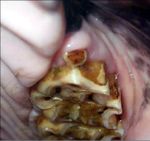Dental Formula - Horse
Overview
The formula for deciduous teeth: 2 (I3/3 C0/0 P3/3)
The formula for permanent teeth: 2 (I3/3 C1/1 P3-4/3 M3/3)
Canines
The canines are rudimentary and in diastema. The size of the root is proportionally larger than the crown.
Molars
The molars have enlarged surfaces and higher crowns. They have delayed root development and complicated folding of enamel.
Incisors
Incisors have high crowns and folded enamel surfaces. Their roots converge.
Premolars
A horse's Wolf tooth (PM1) is often lacking. Molars and Premolars form a continuous surface. Premolars have a high rate of wear and continually erupt. The upper teeth are wider than the lower. There is no infundibulum in the lower teeth.
Ageing
Horses can be aged by their teeth. At 2 and a half the first permanent incisor will erupt; At 3 and a half the second permanent incisor will erupt and at 4 and a half the third permanent incisor will erupt. Over 5 years of age the folding of the enamel ring (infundibulum) can indicate age. There is a 7 year hook and over 13 years of age a dental star will be present.
The Galvayne's Groove is a brown groove on the upper corner incisor teeth and indicates that the horse is over 10 years old. At 15 the groove will be approximately half way down the tooth; At 20 the groove will run down the whole tooth; Over 20 the grove begins to disappear; At 25 the groove will only be visible on the bottom half of the tooth. At 30 the groove will usually be gone.
| Dental Formula - Horse Learning Resources | |
|---|---|
Anatomy Museum Resources |
PowerPoint covering the anatomy and physiology of the equine head and dentition, including the skeletal aspects, the physiology of mastication and it’s associated anatomy as well as common dental abnormalities. |
Error in widget FBRecommend: unable to write file /var/www/wikivet.net/extensions/Widgets/compiled_templates/wrt69a178625e9c52_36049371 Error in widget google+: unable to write file /var/www/wikivet.net/extensions/Widgets/compiled_templates/wrt69a178626d7437_67959117 Error in widget TwitterTweet: unable to write file /var/www/wikivet.net/extensions/Widgets/compiled_templates/wrt69a178627968d3_48144162
|
| WikiVet® Introduction - Help WikiVet - Report a Problem |

